8.5
Safety, value and features
It’s here, Kia’s move on what passes for a volume-selling proposition in the Australian EV market: the new 2023 Niro electric SUV.
That assault won’t come through the virtue of being much more affordable than the EV6, but rather because Kia’s Australian arm has confirmed moderately better supply for the Niro than it’s been able to get for the EV6.
Kia’s outgoing Niro – mechanically a twin to the original Hyundai Ioniq trio – was only on sale in Australia for a year, with the local business unable to secure supply until quite some time after its 2016 overseas launch.
For the new model, Kia Australia will have around 80 cars available each month, with some 60 per cent of those expected to be made up of orders for the EV.
A plug-in hybrid EV model remains an option overseas, but this time the local range goes without, Kia citing a lack of demand for the variant in the outgoing generation. Despite this, Kia says orders for the plug-in hybrid version of the big Sorento SUV have been strong, if strangled by supply issues.
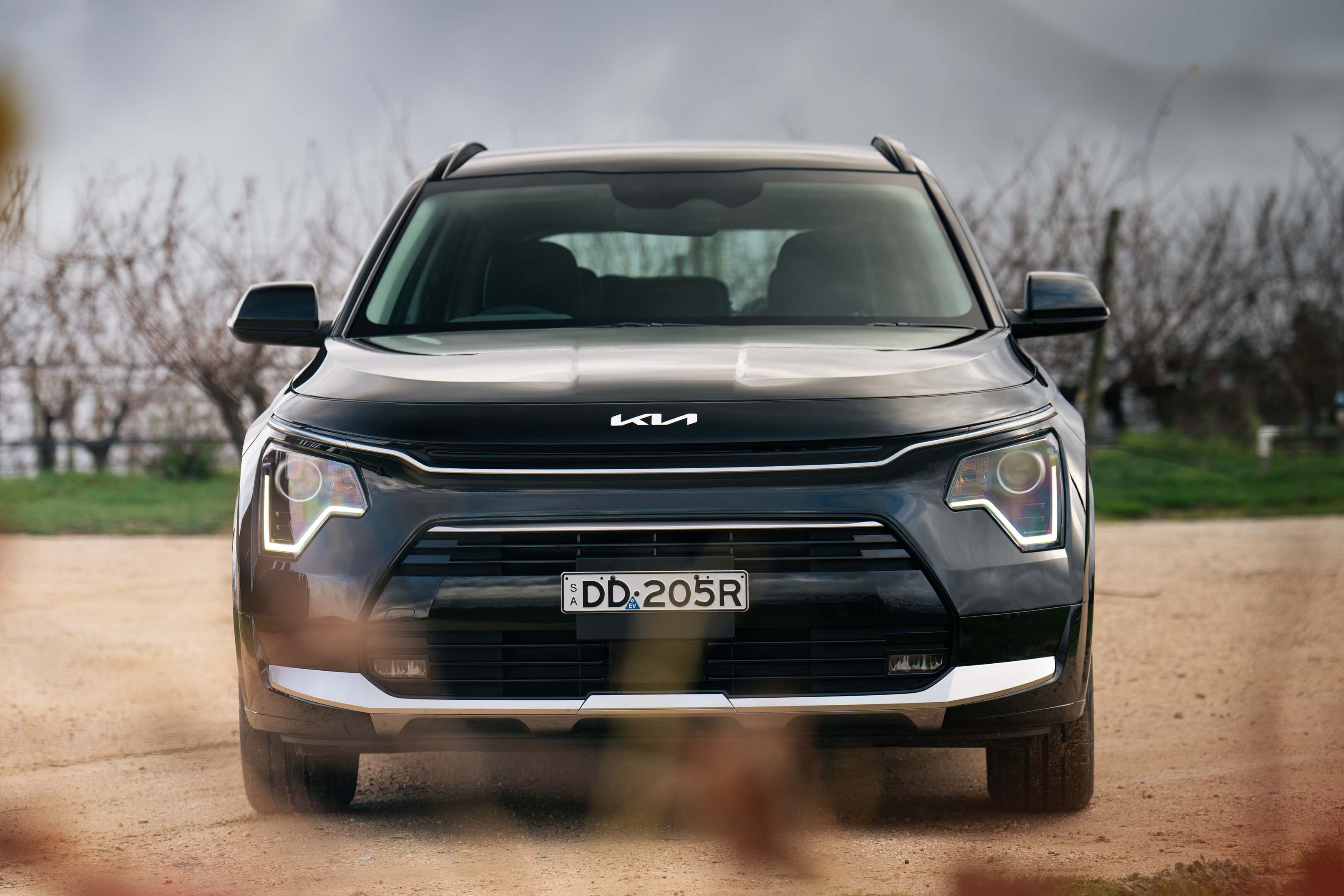
108
For tech-focused drivers, the new Niro’s launch also brings the long-overdue debut of Kia Connect, a platform that provides remote connectivity and control through a phone app, along with live in-car traffic updates and an SOS button. Like Tesla’s app, although not quite as feature-rich, Kia Connect allows owners to check and adjust climate control, door locks, charging, and more.
Rather than offer this as a subscription service from launch, Kia is covering costs for the first seven years – saying it has that much time to figure out how it’ll price the feature beyond the initial complimentary period.
Importantly for Niro buyers, Kia Connect is one of the few bragging rights they’ll have over EV6 owners, with that car – and all other Kia models – not due to get the service locally until its first facelift.
No surprises: Kia Connect is only offered in GT-Line trim grades.
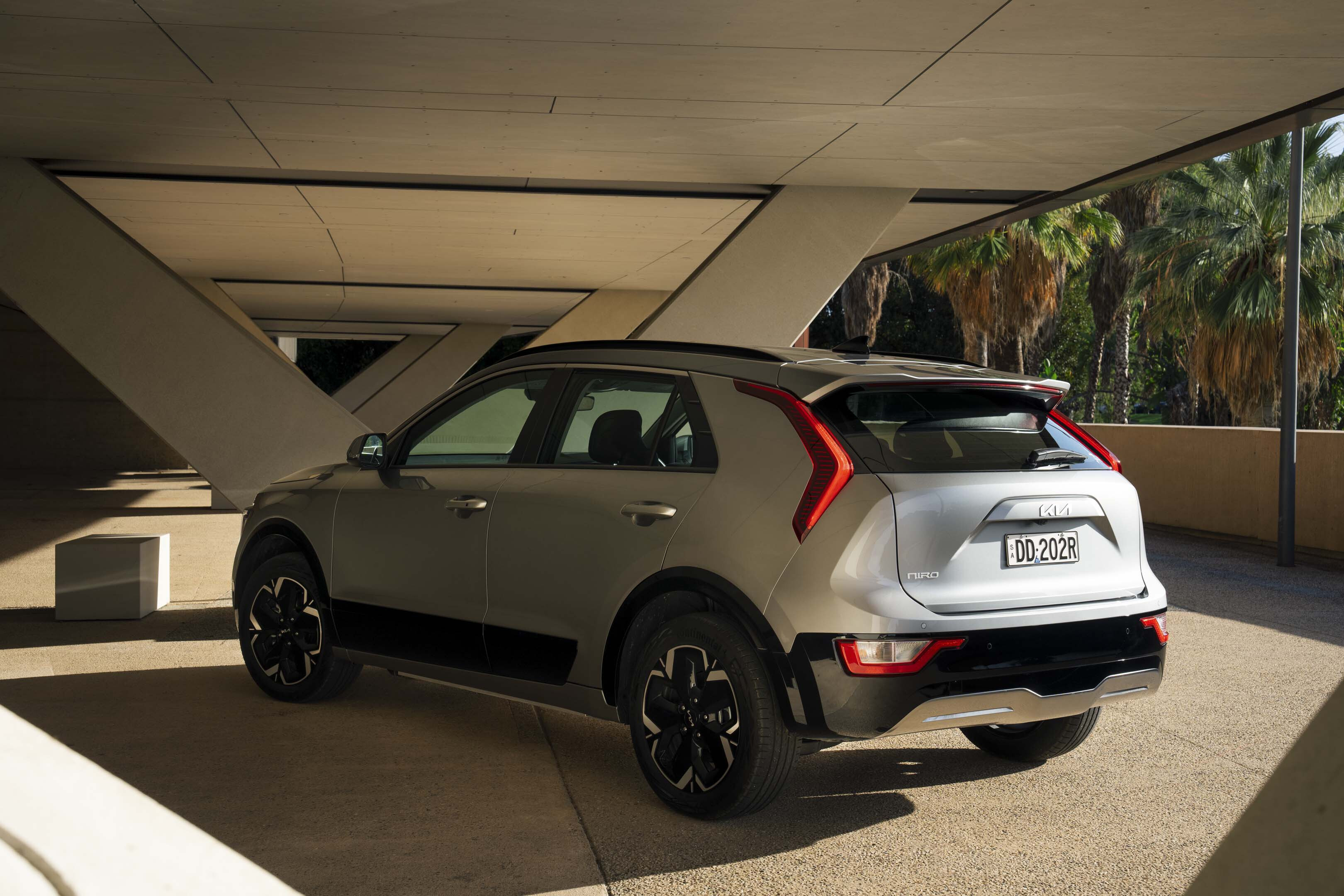
108
Price and features
Where the big 2022 Wheels Car of the Year winning EV6 starts from $67,990 when you can even get into one, the full-electric Niro carries a similarly high price point of $65,300 for the entry Niro S, and $72,100 for the top-spec GT-Line – up by $2710 and $6110 for the previous model (all prices before on-road costs and regional EV incentives are factored in).
The flagship Niro GT-Line is at least markedly more affordable than the equivalent EV6, with that GT-Line priced from $74,990 in rear-wheel drive, swelling to $82,990 for the AWD model (again, before on-road costs and EV incentives are applied).
A petrol-electric hybrid model is also offered, priced from $44,380 for the S trim and $50,030 for the GT-Line – marking an increase of $4390 and $6140 respectively over the previous ‘DE’ generation (both before on-road costs).
The hybrid’s price brings it perilously close to the larger and hugely popular Toyota RAV4 hybrid in comparable Cruiser 2WD form, but as Kia Australia product manager Roland Rivero told me at the Niro’s launch event – Niro hybrid buyers can at least expect to get into one quickly, while RAV4 hybrid orders are suffering lengthy waits.
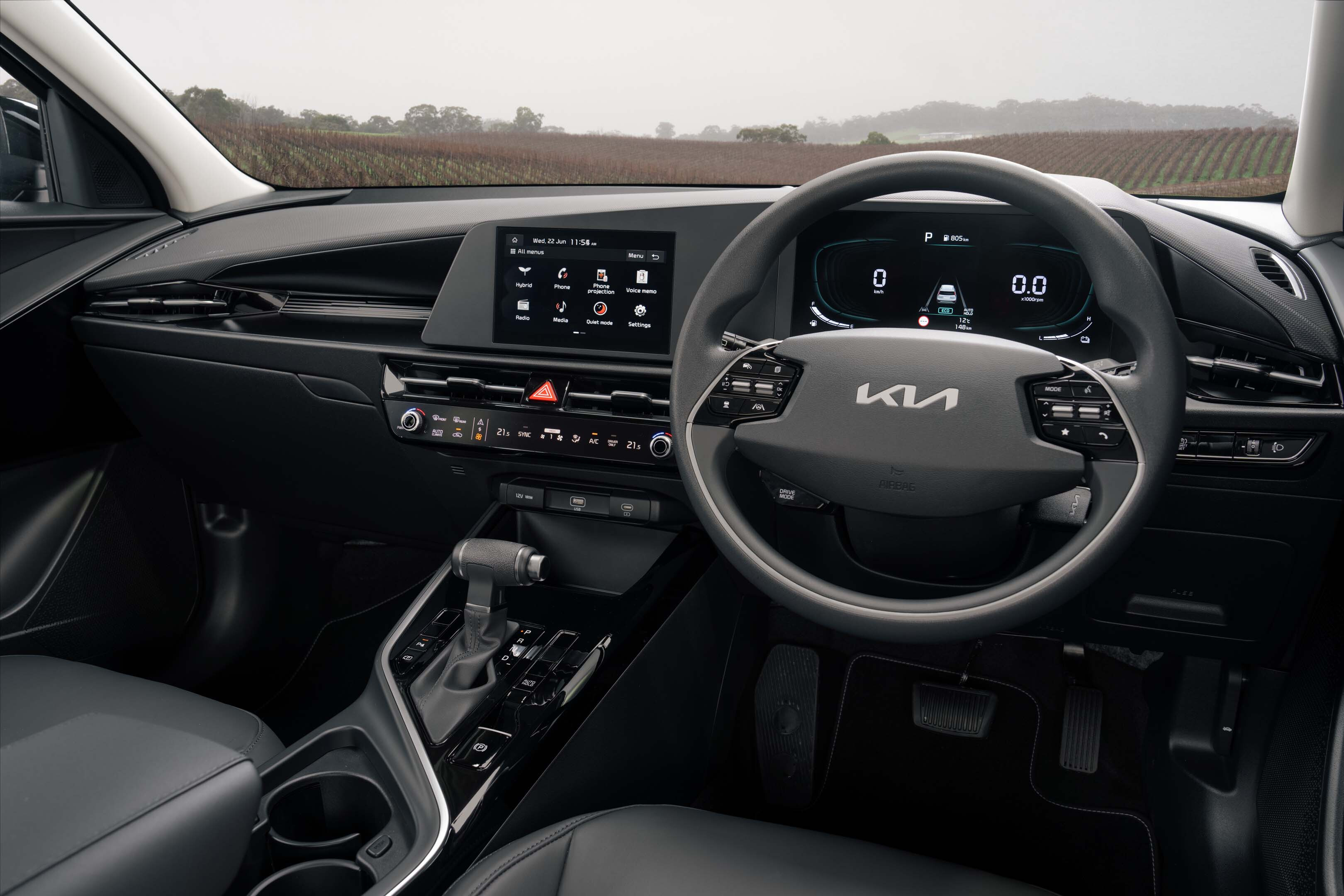
108
The lacklustre equipment list in the entry-level S is sure to inspire an upgrade to GT-Line – as surely intended – with features limited to 16-inch alloy wheels, an 8.0-inch infotainment display coupled to a retro-styled instrument cluster with fixed LCD animations and a 4.2-inch screen, wireless Apple CarPlay and Android Auto, six speakers, a polyurethane steering wheel and combination cloth/artificial leather seat trim, and a laminated windscreen.
There’s no integrated sat-nav in the S grade, but this is easily overcome with phone mirroring – as Kia obviously expects most buyers to be satisfied with.
Going for the electric S over the hybrid improves the feature list, adding 17-inch wheels, interior V2L (vehicle-to-load appliance charging), and a full 10.25-inch instrument display behind the steering wheel.
Standard safety kit includes autonomous emergency braking with junction collision avoidance, blind-spot collision avoidance, rear cross-traffic collision avoidance, lane-keep assist, multi-collision braking, a centre side airbag, intelligent speed limit assist, reversing camera, rear parking sensors, adaptive cruise control and high-beam assist. The Niro has not yet been given an ANCAP crash safety rating.
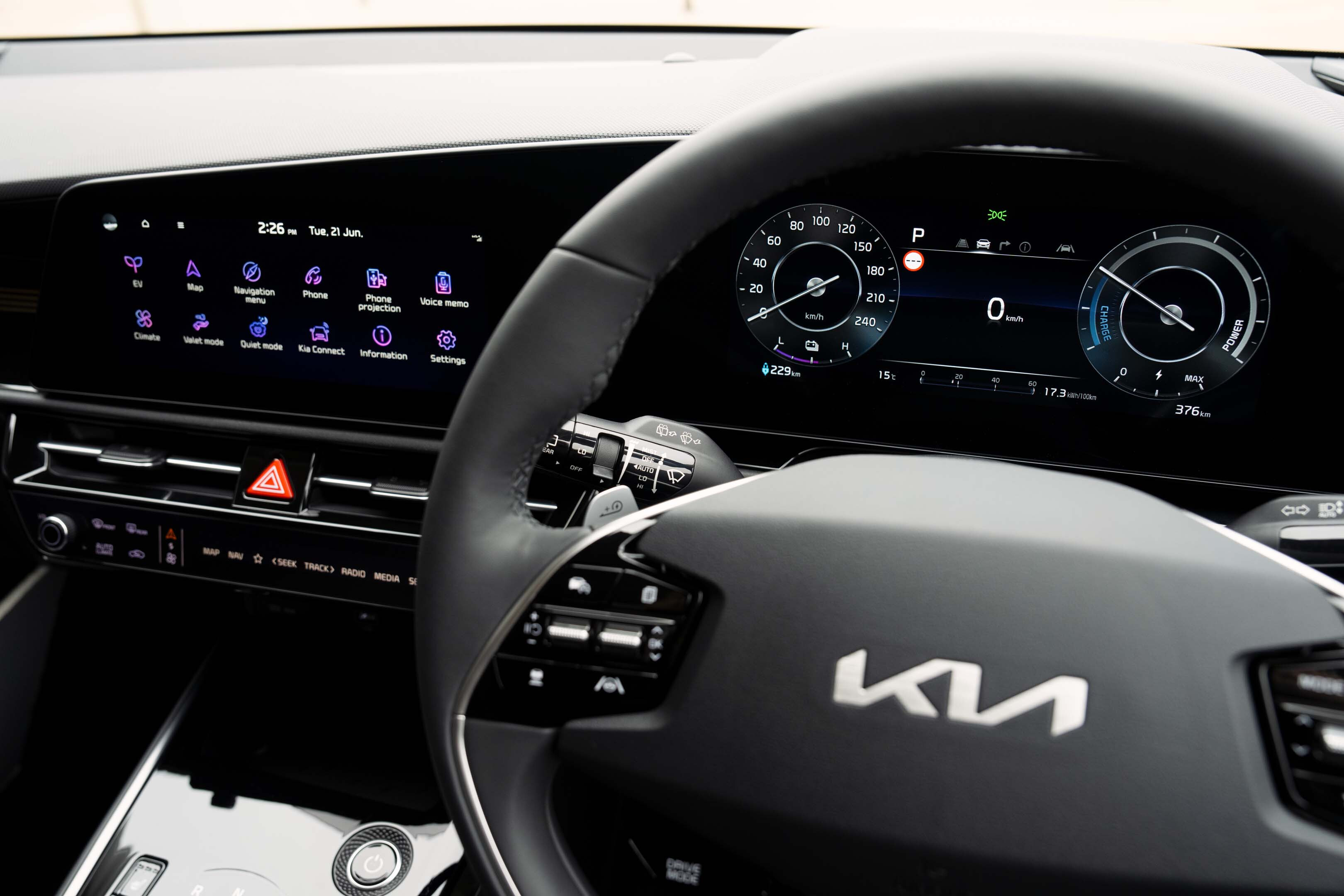
108
Stepping up to the GT-Line adds 18-inch wheels for the hybrid (the EV sticks with 17s), laminated front door glass for better noise suppression, full-recline ‘relaxation seats’ up front, ambient mood lighting, bigger dual 10.25-inch displays, a big 10-inch head-up display, Kia Connect, wireless phone charging, and a downgrade to wired Apple CarPlay and Android Auto – an ongoing problem for the top-spec models in both the Kia and Hyundai lines.
Android users should also note that while Apple CarPlay is a full-screen experience in the Niro, Android Auto is again confined to a narrower space, with the right-hand third of the display devoted to a black background with the Android Auto logo proudly displayed.
US-market Hyundai models have received a software update to improve this, but at the time of writing, no Australian Hyundai or Kia models offer a full-screen experience for Android Auto.
UPDATE: Android Auto update appearing for some users
A new software update is rolling out, it seems. A Kia Australia employee has today sent us the below photo that shows Android Auto filling the screen. Judging by the look, this change is unrelated to the upcoming Google-side design update.
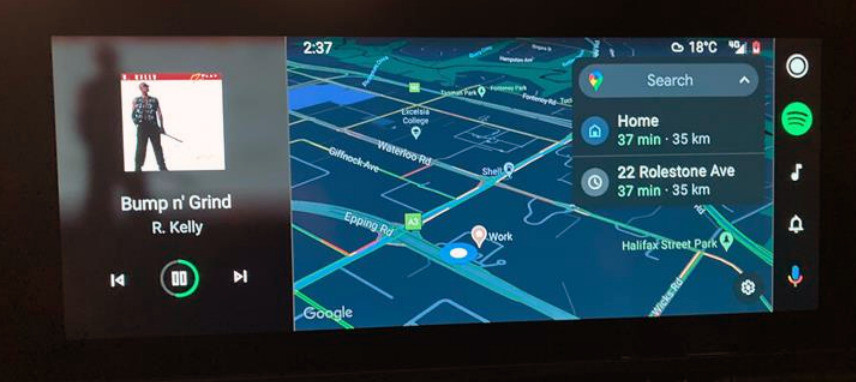
108
Story continues…
There’s also a rotary gear selector, tinted windows at the rear doors and hatch, artificial leather seats and steering wheel, heated and ventilated front seats, heated steering wheel, Remote Smart Park Assist, a powered tailgate, rain sensors, front and rear parking sensors, powered child lock, and rear low-speed auto emergency braking.
Exterior V2L, a tilt and sliding sunroof, powered position and lumbar support for the front passenger, and eight-speaker Harman Kardon audio are also standard on the electric GT-Line.
Most of the above features are new for the SG2 Niro, improving dramatically on the spec of the previous generation and, as far as Kia is concerned, justifying the significant price leap for all variants.
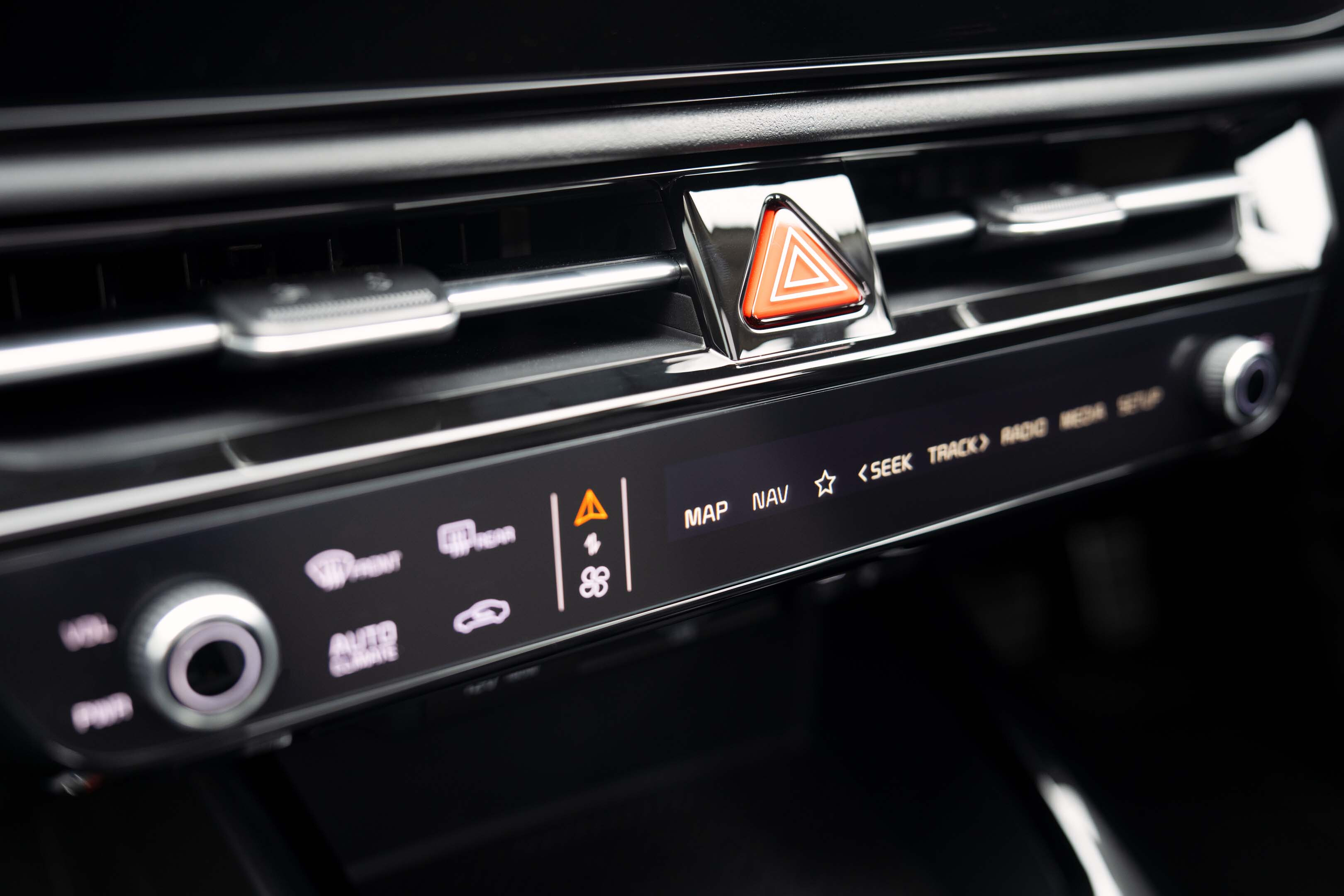
108
Comfort and space
Officially a small SUV, the new ‘SG2’ Niro shares its platform with the new-generation i30 Sedan, allowing it to accommodate a petrol engine for hybrid and PHEV applications, whereas the E-GMP platform of the EV6, Hyundai Ioniq 5 and Genesis GV60 is a dedicated all-electric design.
In its new form, the Niro is between 45 and 65mm longer than the DE, at 4420mm overall. Its wheelbase has grown 20mm to 2720mm, and width is also up 20mm to 1825mm.
Height is unchanged at 1545mm (hybrid) and 1570mm (EV), but smarter packaging sees rear headroom grow by 12mm and 10mm respectively.
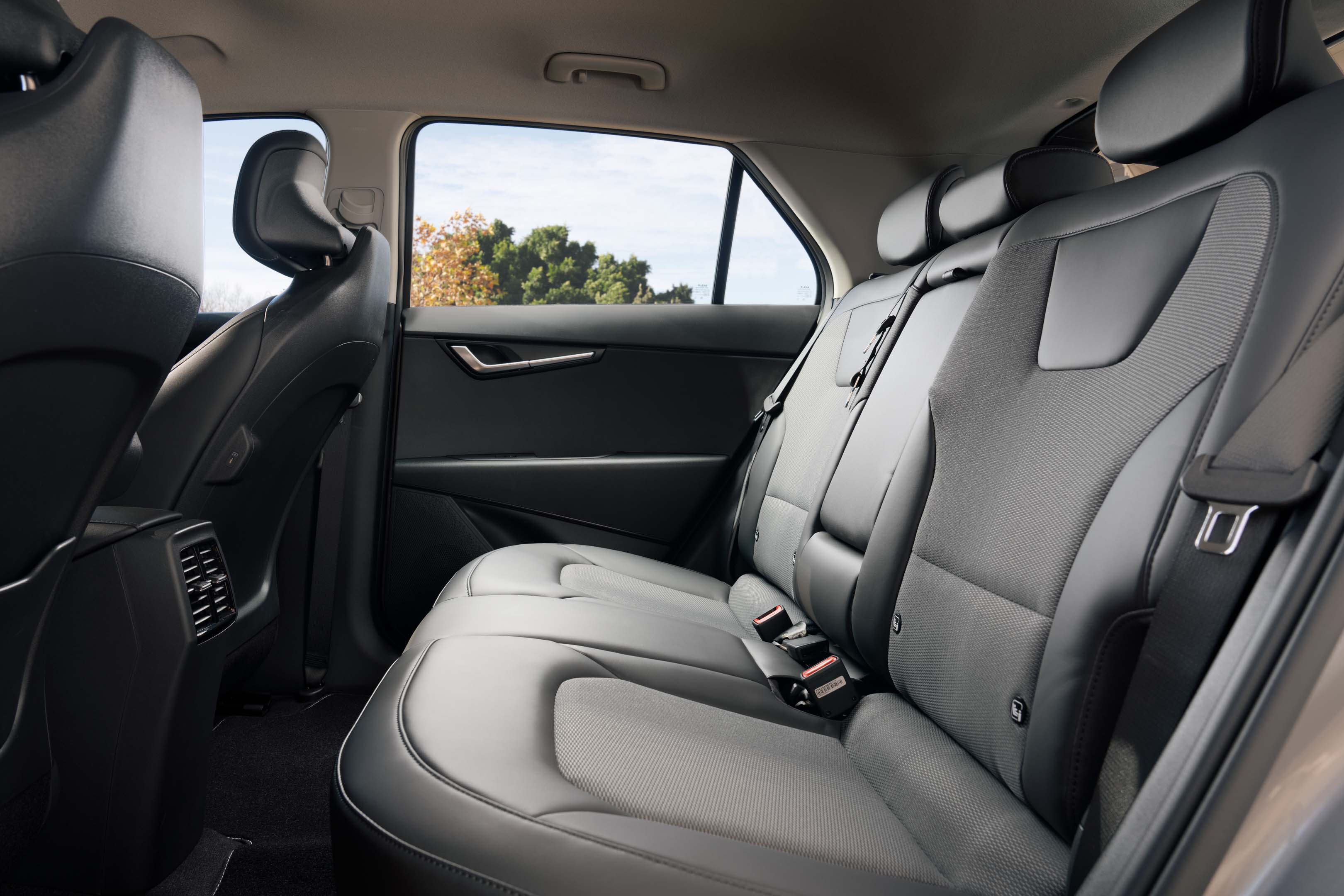
108
2022 Kia Niro dimensions
| Length | 4355 / 4375 | +65 / +45 | 4420 |
|---|---|---|---|
| Width | 1805 | +20 | 1825 |
| Height | 1545 / 1570 | – | 1545 / 1570 |
| Wheelbase | 2700 | +20 | 2720 |
| Front overhang | 870 / 885 | +25 / +10 | 895 |
| Rear overhang | 785 / 790 | +20 / +15 | 805 |
| Couple Distance | 834 | +36 | 870 |
| Rear Headroom | 993 / 957 | +12 / +10 | 1005 / 967 |
| Rear Legroom | 950 / 914 | +61 / +24 | 1011 / 938 |
Boot space with the rear seats upright, measured to the VDA standard, grows from 410 litres (hybrid) and 451 litres (EV) to 425 and 475 litres respectively, while seats-down figures are up from 1408 to 1419 litres in the hybrid, but down from 1405 to 1392 litres with the EV – that’s despite there being a puncture repair kit in place of a spare wheel – although an extra storage area under the bonnet claws back 20 litres.
For context, these numbers are comparable to models like the Honda HR-V or Nissan Qashqai, among the best in the small-SUV segment.
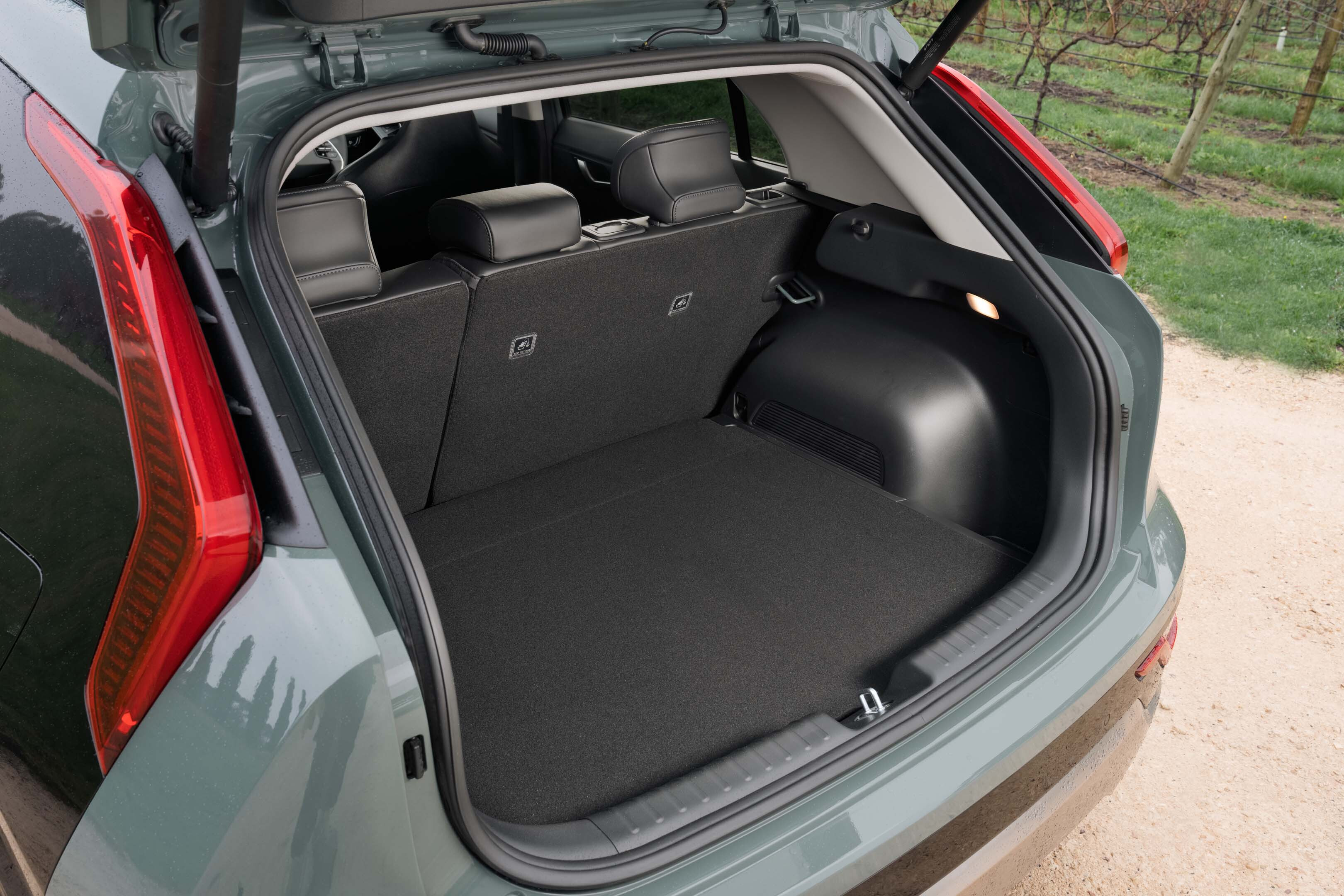
108
The presentation of the Niro’s cabin will be familiar to those who’ve sat in an EV6, with a dash and centre console design that is largely identical. As with the more stylish exterior, the new Niro’s interior appears far more modern and premium than its predecessor.
Interior comfort and freedom to move are good, offering a sense that the Niro sits a little closer to bigger medium-segment SUVs when it comes to shoulder space and legroom – although the rear is still more of a two adults or three kids arrangement.
Rear legroom is excellent for the segment, though, thanks in particular to the flat floor, and air vents in the back of the centre console add to rear comfort too.
Up front, occupants benefit from firm but comfortable seats that offer good thigh support and bolstering against lateral movement.
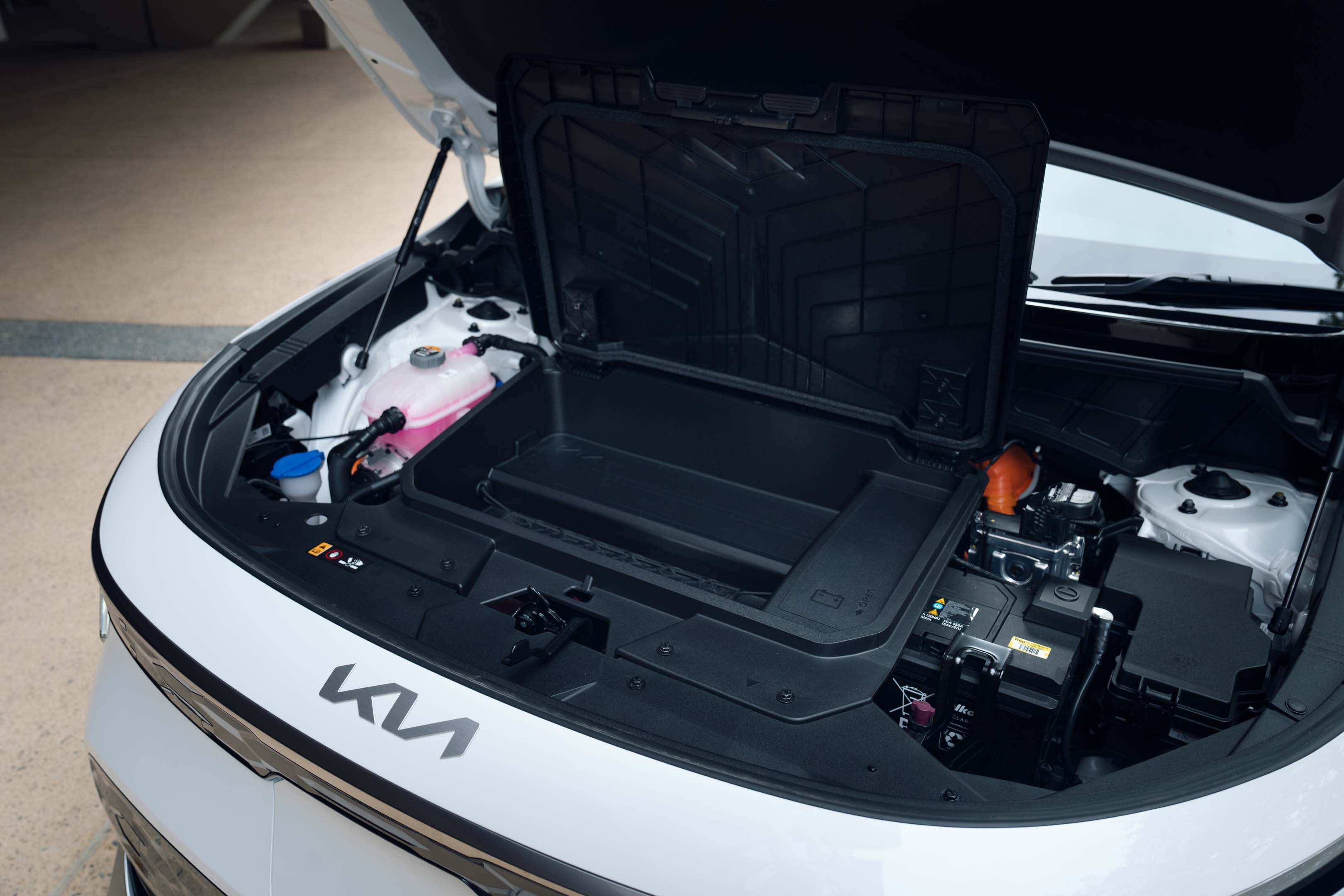
108
Piloting an electric GT-Line from the launch event in Adelaide to the Wheels Media base in Melbourne, a journey that took around 15 hours with charging and other stops, I remained blessedly comfortable in the driver’s seat with no pain or fatigue beyond my junk-loaded road-trip diet and an eventual need to catch some shut-eye.
Kia and Hyundai’s infotainment and associated controls remain some of the most stylish and feature-rich yet user-friendly in the business, although the innovative and space-saving ‘dual control panel’ that switches between climate control and media controls can take some getting used to.
However, since most of the media functions are replicated on the steering wheel, it’s simple enough to leave this panel on the climate settings.
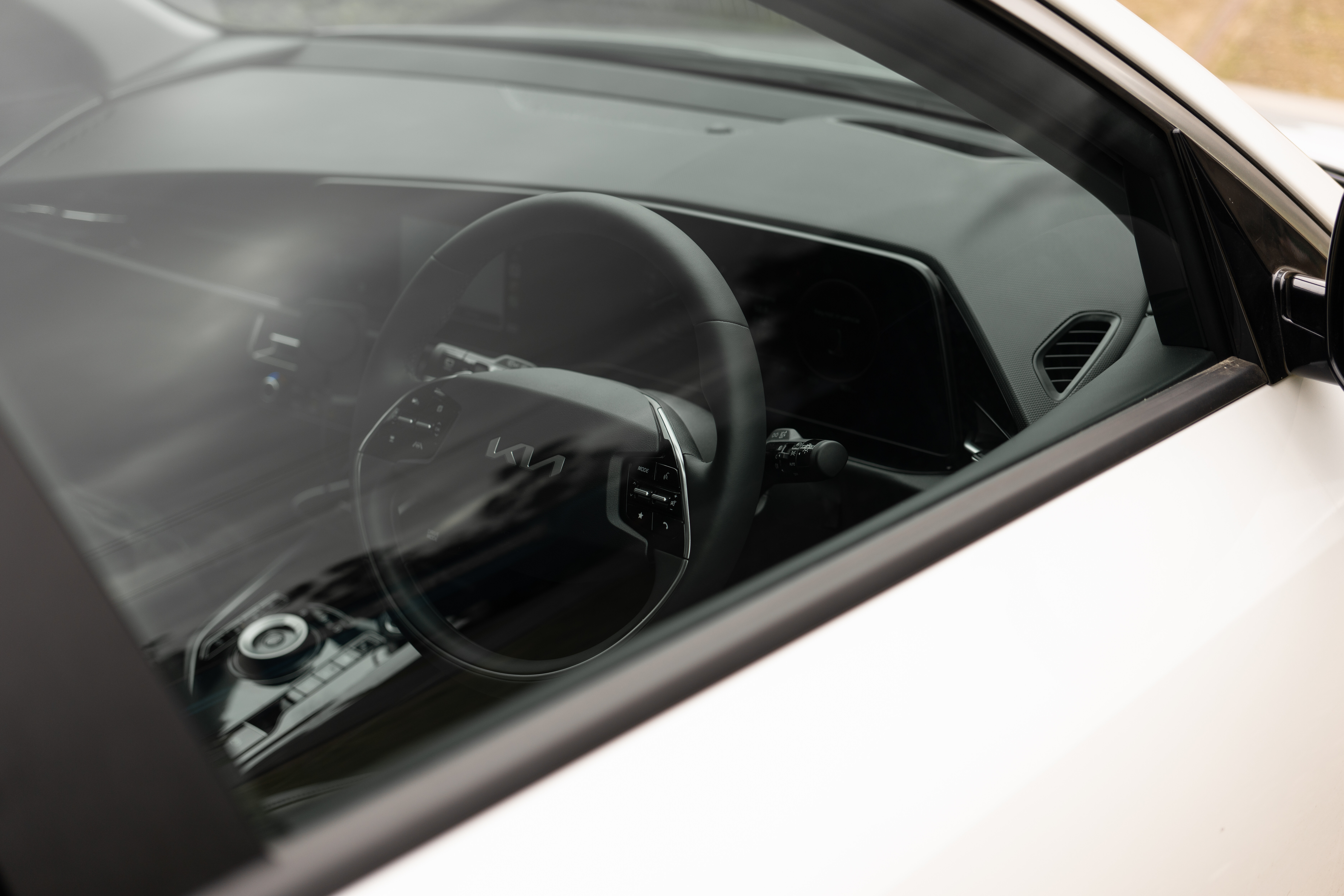
108
Power and claimed numbers
The new Niro is offered in petrol-electric hybrid and full-electric forms, with the former pairing a 77kW/144Nm 1.6-litre naturally-aspirated four-cylinder engine with a 32kW/170Nm electric motor.
Combined system output is 104kW but, like Toyota, Kia doesn’t reveal a specific number for combined torque. Power is sent to the front wheels through a six-speed dual-clutch transmission.
A small 1.32kWh lithium-ion battery is on board with the hybrid, and Kia claims a combined fuel consumption figure of 4.0L/100km – an improvement over the 4.4L/100km figure of the previous model.
In the EV, both the S and GT-Line versions get a ‘long range’ 64.8kWh battery pack (the EV6 gets a 77.4kWh pack), delivering energy to a 150kW, 255Nm electric motor. Power is again sent to the front wheels only, this time through a single-speed automatic transmission.
The Niro EV claims a maximum driving range of 460 kilometres on one charge, slightly bettering the 455km number of the older model.
A combined efficiency figure of 16.2kWh/100km is also claimed, slightly bettering the bigger and more advanced EV6’s best figure of 16.5kWh/100km in the entry-level Air spec.
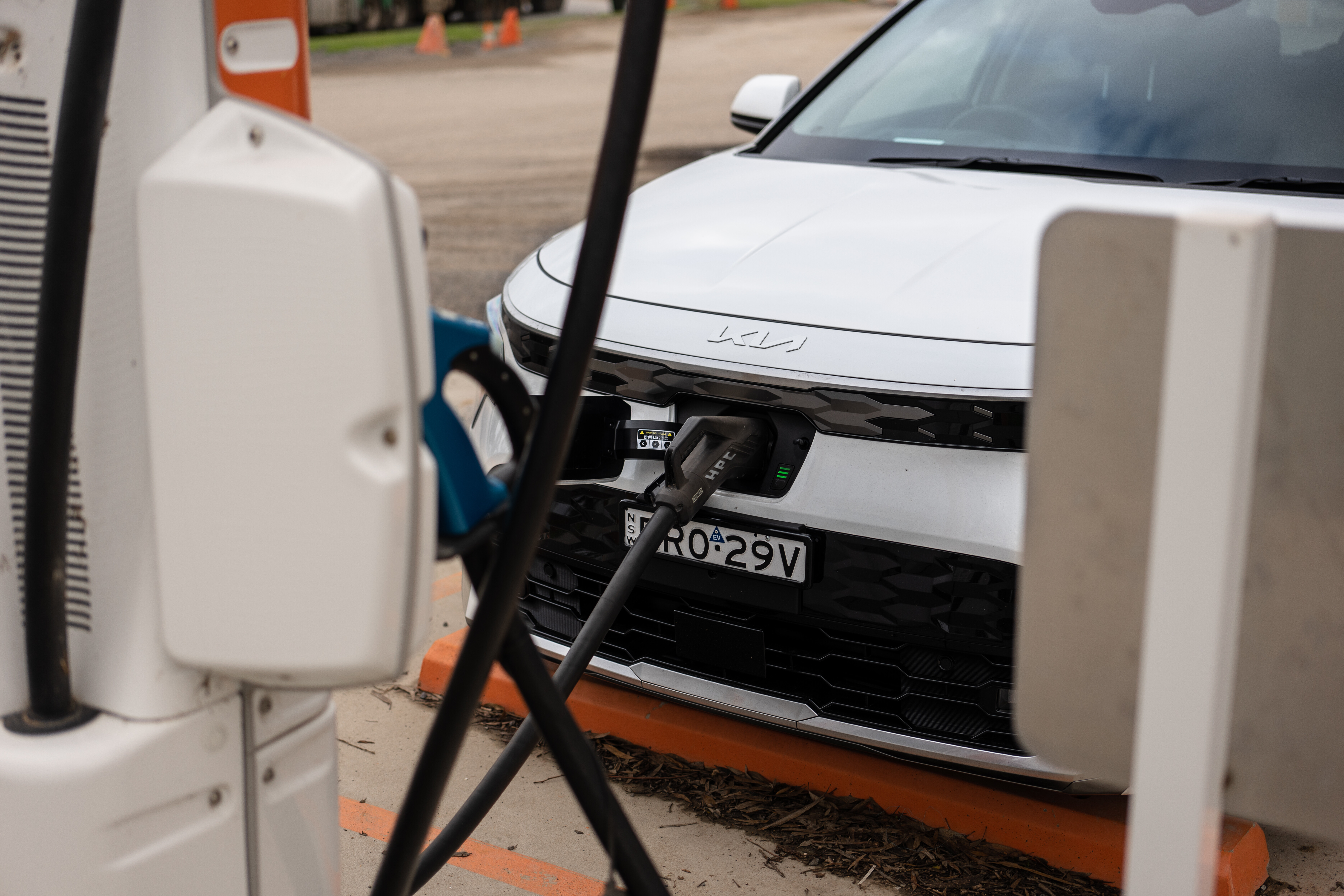
108
For buyers drawn to the fabled thrilling acceleration of electric vehicles, the Niro electric isn’t as rapid as some – but with a 0-100km/h time of 7.8 seconds and a fairly instant shove from the electric motor, it’s still fun to bury the pedal. The more important 80-120km/h run comes on faster at 5.0 seconds.
The hybrid is markedly slower, with a claimed 0-100km/h time of 10.4 seconds and a 7.6-second shuffle from 80 to 120km/h.
The hybrid is the pick if you intend to do any towing, although – like all small SUVs – neither offers particularly impressive numbers. The hybrid claims braked and unbraked numbers of 1300 and 600kg, while the EV lists 750 and 300kg respectively.
Both cars are on the heavier side of the small SUV segment, the EV in particular due to its big battery pack, with the hybrid tipping the scales at 1454kg and the EV at 1727kg. Again for context, the Nissan Qashqai weighs around 1300 to 1450kg, depending on variant.
The Niro in both variants has a super-tight turning circle of just 10.6 metres.
Niro electric charging, and the real-world experience
Unlike the ultra-rapid 18-minute charge from 10 to 80 per cent boasted by the EV6 through its 800V architecture, the Niro charges considerably slower – although certainly at a comparable speed to most other EVs currently available in Australia.
Connected to a powerful 350kW DC charger, the new Niro will go from 10 to 80 per cent in 43 minutes – although the time can vary considerably, depending on the existing charge level when you first plug in.
| Energy cons. (claimed) | 16.2kWh/100km |
|---|---|
| Energy cons. (on test) | 21.8kWh/100km |
| Battery size | 64.8kWh |
| Range claim (WLTP) | 460km |
| Charge time (11kW) | 6h 20m |
| Charge time (50kW) | 1h 5m |
| Charge time (100kW) | 45m |
Ownership
The Niro is sold with the same seven-year, unlimited-kilometre warranty offered with all Kia models.
Servicing for both versions is due every 12 months or 15,000 kilometres and, no surprise, the more complicated petrol-electric hybrid is the more expensive to service.
With the hybrid, capped price servicing will work out to $4010 over seven years, available only in a ‘pay on the day’ arrangement. The EV has the option of per-visit payments or a pre-paid deal, but each will work out to $1751 over seven years.
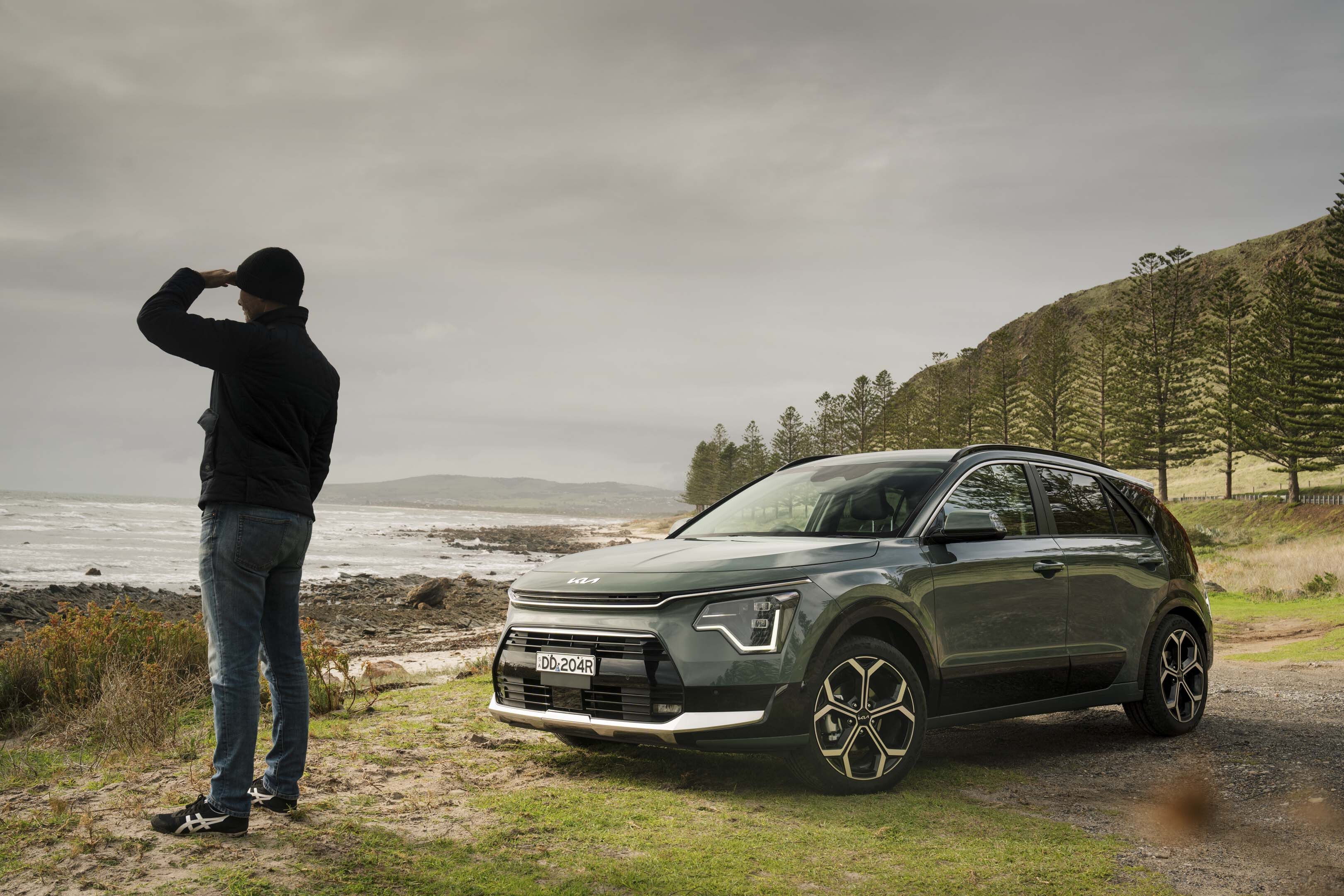
108
On the road
Hybrid
In hybrid form, our drive experience was limited to the GT-Line with its big 18-inch wheels and low 45-profile tyres. Ride comfort in this configuration falls short of ideal – as is often the case on big wheels – feeling a little too firm when navigating unsealed or poorly maintained roads, but not excessively so.
Unlike the previous model, the new Niro benefits from Kia Australia’s partnership with Graeme Gambold, who has again applied his expertise in ride and handling to a local tuning and parts selection program. However, it’s hard to say that the hybrid, at least in GT-Line form, has truly benefited from this work.
But, those who prefer a firmer ride, perhaps interpreting it as a naturally more sporting setup, may find the result satisfying. Its planted feel through corners – combined with a weightier steering tune in Sport mode that feels progressive and accurate, if not communicative – at least makes the Niro an entertaining drive when pushed.
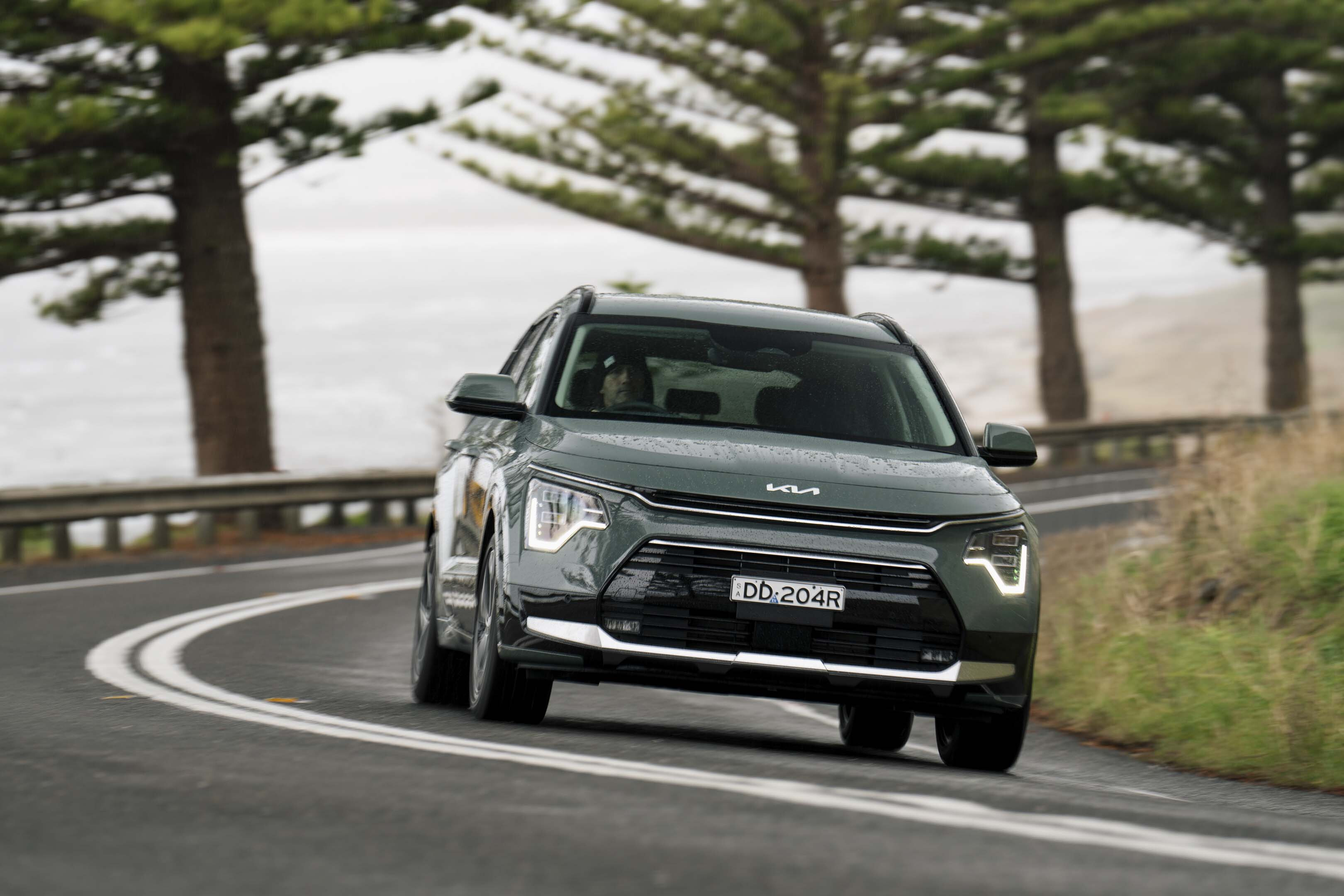
108
Acceleration and mid-range pickup are at least satisfying. While not especially swift, the Niro hybrid benefits from a six-speed dual-clutch automatic that delivers rapid gear changes and saves drivers from the drone and rubber-band feel of the CVT design used in Toyota’s RAV4 hybrid.
Interestingly, the dual-clutch auto does away with the conventional reverse gear, instead using the electric motor for backing up. Kia says this change alone has saved 2.3kg in overall weight.
The hybrid has paddles behind the steering wheel that serve two distinct functions – changing gears when running primarily as a petrol car, and brake regeneration when utilising electric power.
A launch event is not the best scene to measure fuel consumption, with multiple journalists testing the vehicles to their lawful limits, but our time with the Niro hybrid returned a figure of 5.3L/100km – suggesting a real-world average closer to the claimed figure could be achievable.
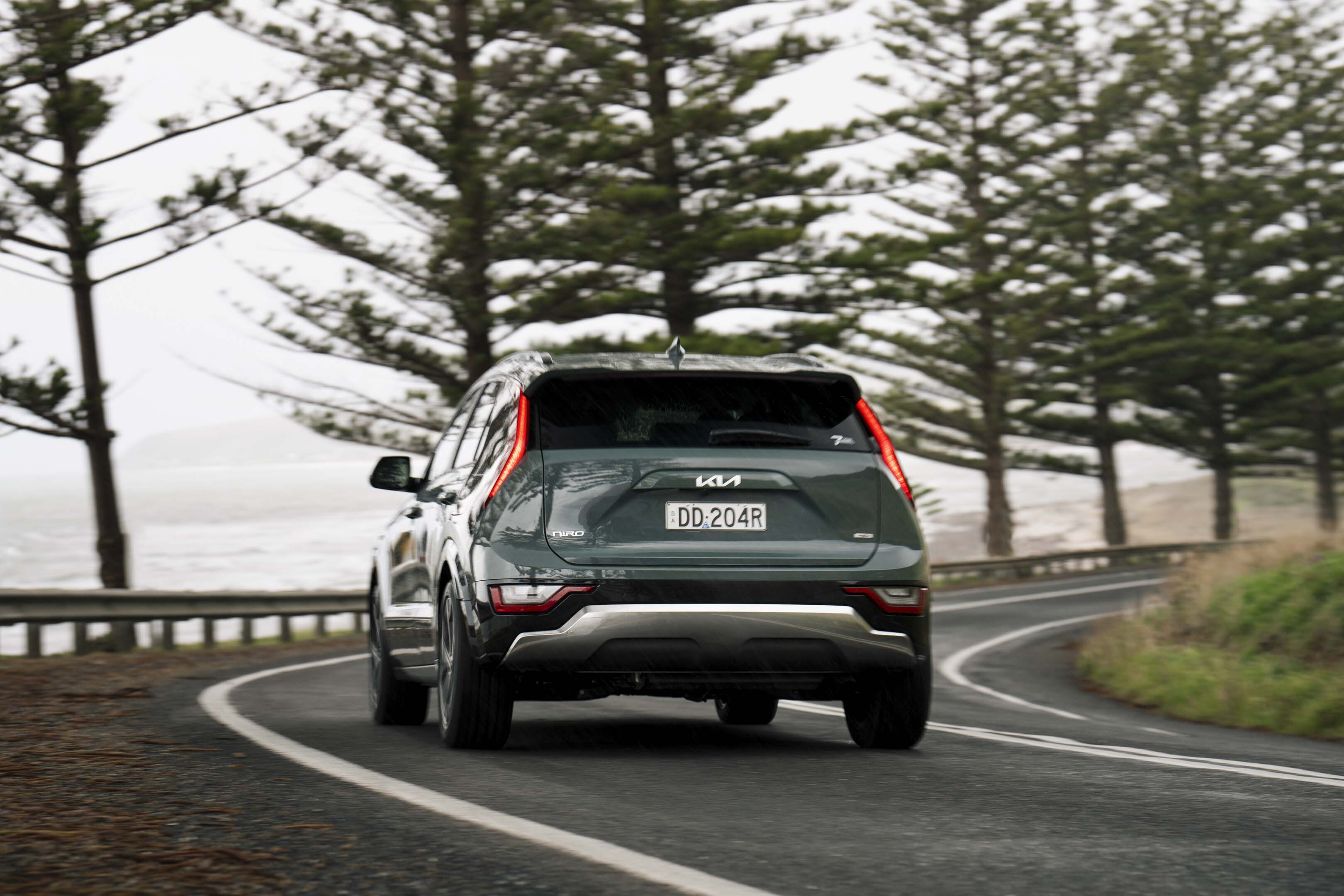
108
Electric
The electric model rides exclusively on 17-inch wheels, which diminishes style and sportiness a touch, but this is outweighed by the ride comfort and – most importantly – the longer driving range delivered with smaller, narrower wheels and a bigger 55 profile to the rubber.
Still, Gambold’s input, while not a work of physics-defying magic, ensures the electric Niro isn’t barge-like in its ride. It’s still firm, but well controlled.
Although nearly 300kg heavier, thanks to that battery pack, its lower centre of gravity and more rapid acceleration at any point means the EV feels quicker than it really is, and keeps the body roll usually associated with higher-riding models well in check.
Like the hybrid, the EV gets paddles behind the steering wheel, focused here specifically on brake regeneration. In the electric model, that means three levels of regeneration – and a corresponding body feel that in its heaviest setting can take some getting used to – along with i-pedal, a one-pedal driving mode that allows you to safely come to a stop in most driving situations without needing to touch the brake.
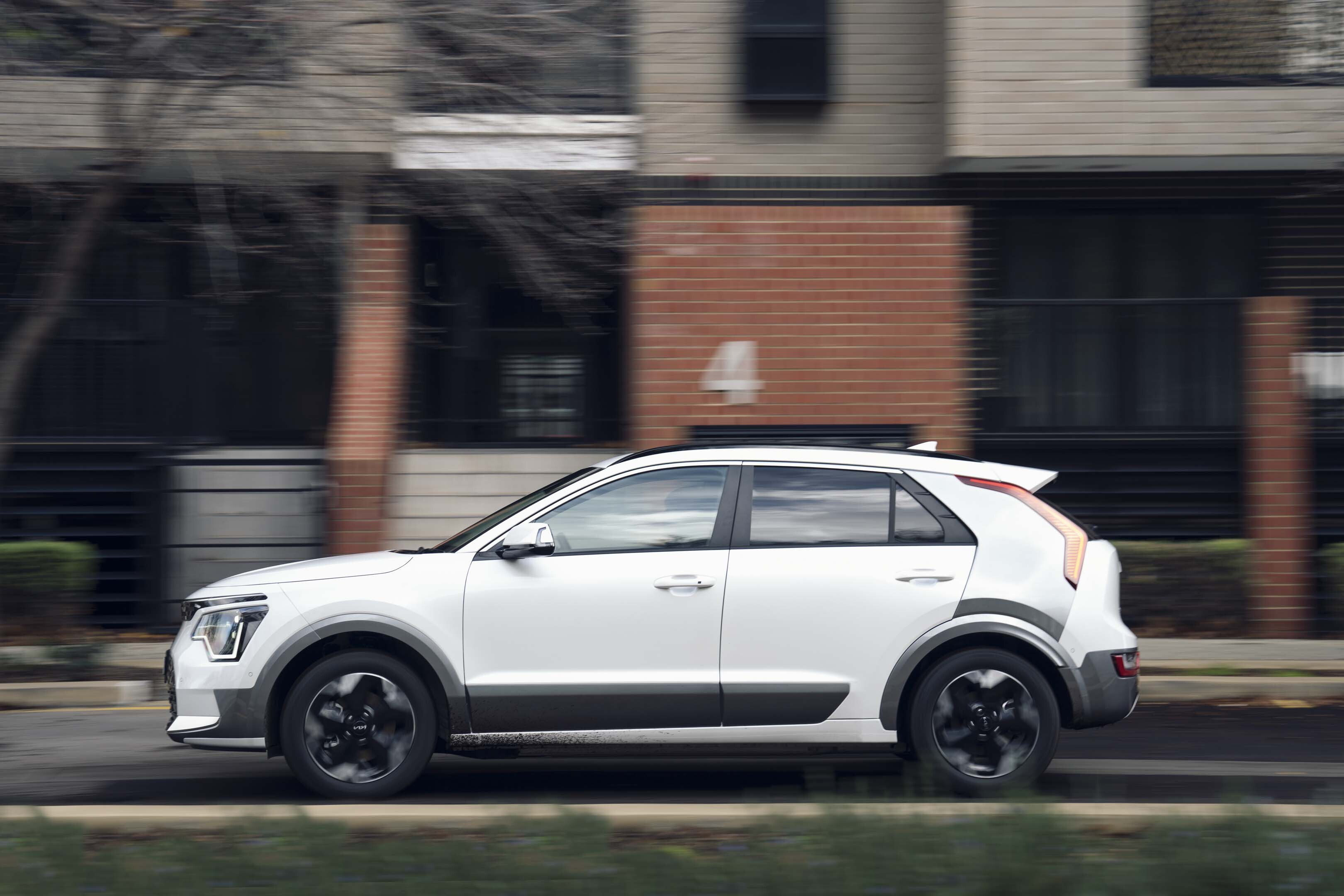
108
In its stronger settings, the brake regen also offers a handy advantage for spirited driving, allowing you to simply lift off the accelerator as you enter corners, avoiding the brake pedal altogether.
Astute readers may have noticed that torque is down significantly in the new electric Niro, now at 255Nm compared to 395Nm in the previous model. Kia says this was done to improve all-round driveability, reducing useless torque steer while protecting driving range and tyre life. And, since the new EV gets to 100km/h just as quickly as the old model, it seems to have worked out fine.
Efficiency in the EV is claimed at 16.8kWh/100km on a combined-cycle WLTP test, but our experience on the launch drive – again not an ideal setting for measuring such things – saw numbers jumping around between 19 and nearly 21kWh/100km, the latter coming on mostly in the longer highway legs of the drive, where EVs are at their least efficient. (Although a friend recently sent me data that showed his Tesla Model 3 had achieved 11.3kWh/100km over a 200km trip of combined highway and urban speeds…)
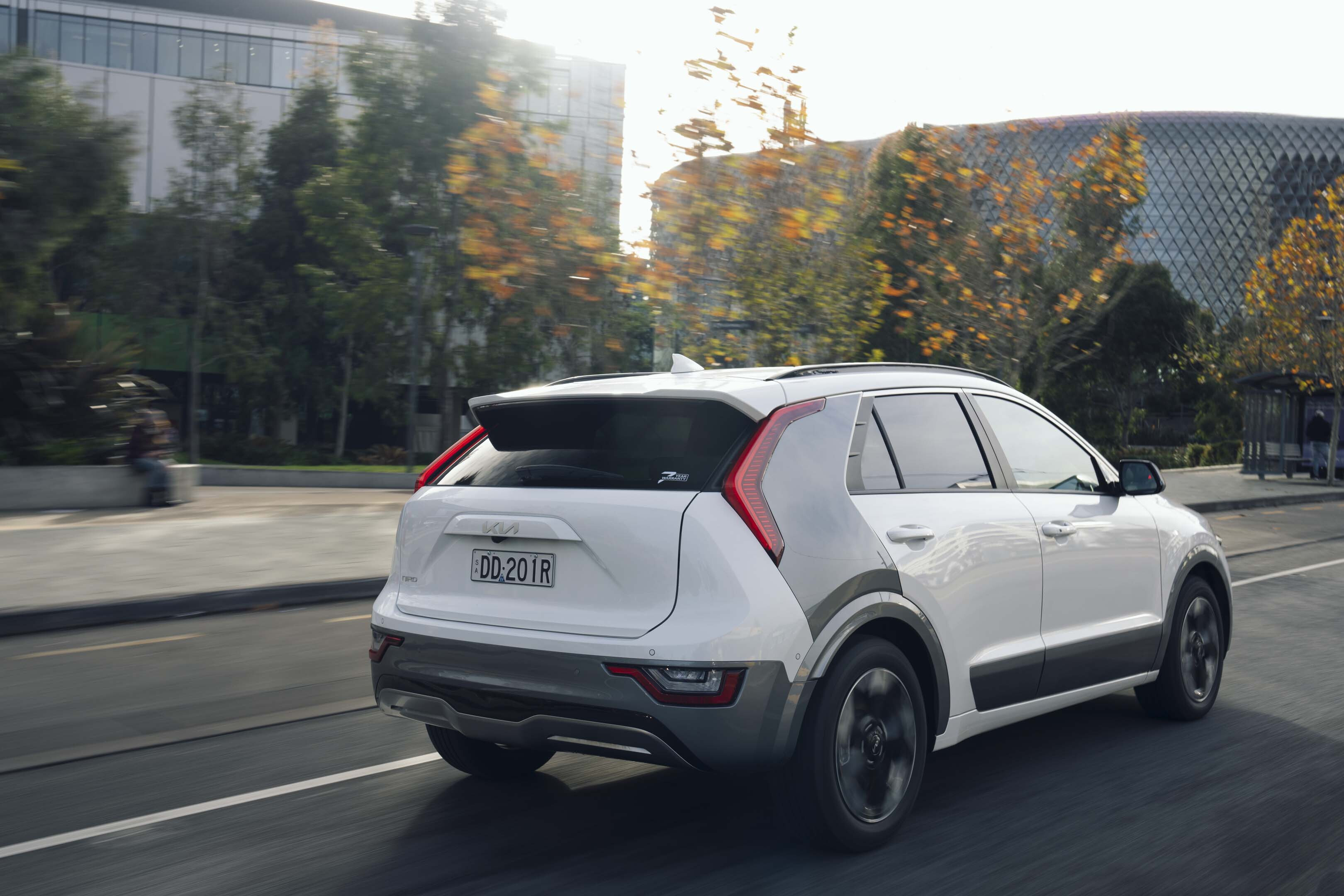
108
Road trippin’, Adelaide to Melbourne
Following the launch event in Adelaide, I borrowed an electric Niro to drive back to Melbourne. Bound for our Mulgrave headquarters, I was off on a drive that would in a conventional car take just under nine hours over 750 kilometres.
Of course, it’s a different story in an EV. Not having recharged the Niro before leaving, I left Adelaide with 257km of indicated range, so my first stop was the 350kW Chargefox station at Murray Bridge, 75km away. I arrived with 159km of indicated range remaining and trip efficiency at 18.3kWh/100km, with a fair amount of brake regeneration opportunities available over that first leg of the journey. I was up for a 15-minute wait to get to 80 per cent, but I wanted a full recharge – so it was going to be just over an hour. Even at 91 per cent, with charging speed curving down to about 14kW, it was going to be a 30-minute YouTube session for me.
It was more of the same for the rest of the drive, with more lengthy charging stops at Keith (efficiency on arrival at 20.2kWh/100km due to higher speeds and less brake regen), Horsham and Ballarat, before powering on to Mulgrave.
As a savvy follower on Twitter noted, I could’ve enjoyed shorter charging waits by cutting off at 80 per cent, but it would’ve meant more stops – so, really, it’s up to the driver. Fewer stops with longer waits, or more stops with shorter waits.
Like I said after driving the EV6 from Canberra to Melbourne, driving EVs over long distances requires a recalibration in the minds of buyers. Re-learning what to expect from range calculations, and understanding that highway driving efficiency is pretty much the opposite of what you grew up expecting from internal combustion engines – but the infrastructure to support those drives is only growing.
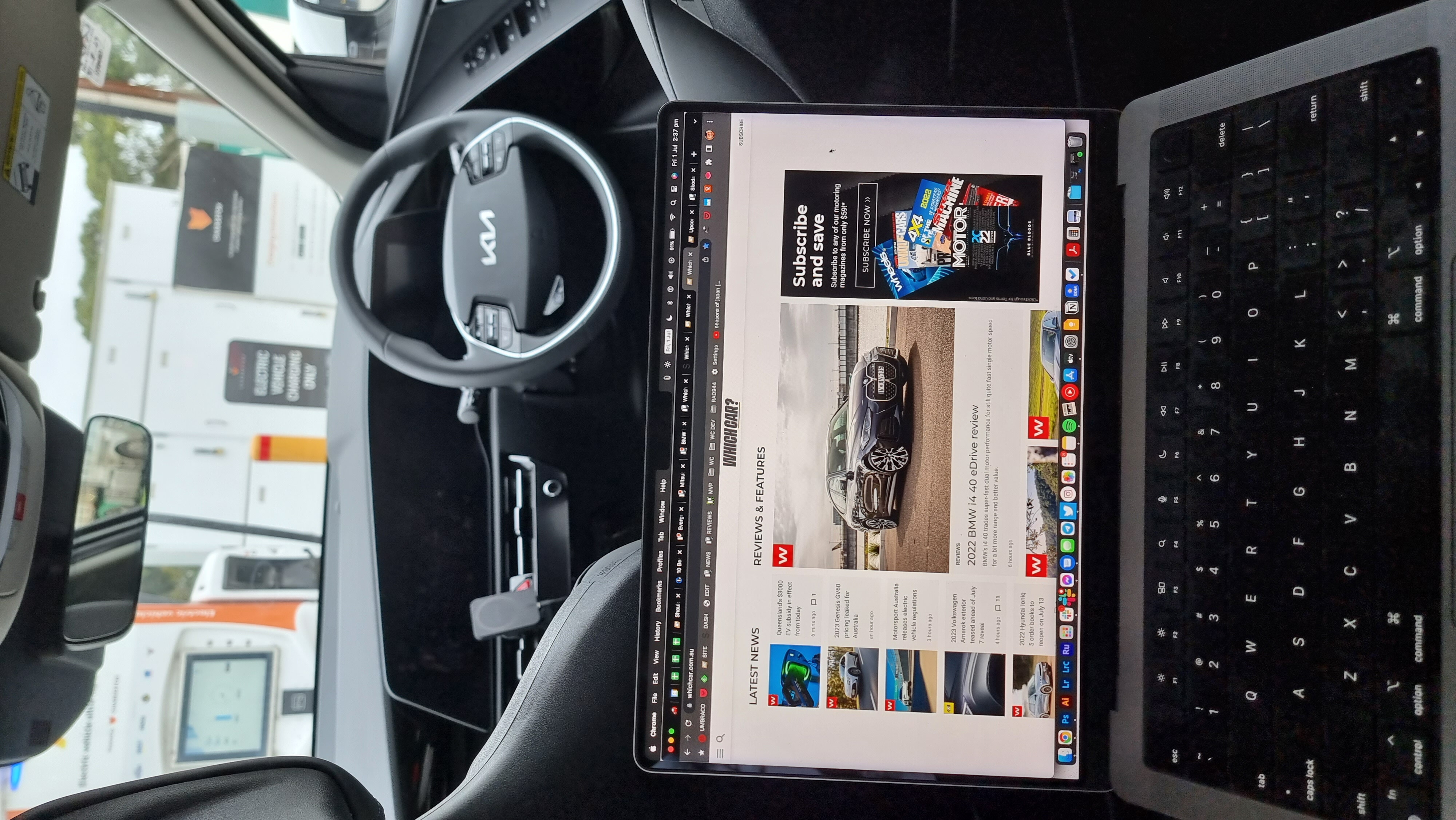
108
VERDICT
Taken in context – that is, with the bigger Toyota RAV4 hybrid available at similar money to the Niro hybrid and the bigger and more advanced Kia EV6 technically available (if you can get an order) from a similar entry price to the electric Niro S – it’s hard to say the Niro feels like a good value buy.
Still, there’s a lot to be said for availability. At around 80 cars each month, Kia isn’t exactly bringing Niros in by the boatload, but with long waits on the RAV4 and the EV6 being virtually unattainable to all but the most patient of buyers (or those prepared to give $100K to lucky early buyers flogging them on the used market), the Niro’s appeal grows stronger.
The slower charging speeds are a debit, but in the greatest chunk of most people’s driving through the year – where the car is plugged in each night at home and driven maybe 100km each day on the usual trips and errands – charging speeds are a largely academic concern.
In isolation, the new Niro feels like a good thing. Now far more advanced and stylish than the previous model, with a mostly comfortable and sporty driving experience, buyers can still feel they’ve landed on a good deal.
But… when other rivals in the $60K range include those from Tesla and Polestar, each offering a serious amount of brand appeal and technological ‘wow’ factor, buyers could easily be tempted away.
2023 Kia Niro specifications
| Key details | 2023 Niro Hybrid | 2023 Niro electric |
|---|---|---|
| Engine | 1.6-litre 4cyl petrol-electric hybrid | front-mounted electric motor |
| Power | 104kW combined | 150kW |
| Torque | 144Nm petrol + 170Nm electric | 255Nm |
| Drive | Front-wheel drive | Front-wheel drive |
| Transmission | Six-speed dual-clutch automatic | Single-speed automatic |
| Weight (tare) | 1454kg | 1727kg |
| Tow rating | 1300kg braked, 600kg unbraked | 750kg braked, 300kg unbraked |
| Fuel/energy consumption | 4.0L/100km | 16.8kWh/100km |
| Brakes | 280mm ventilated discs front / 262mm solid discs rear | 305mm ventilated discs front / 284mm solid discs rear |
8.5
Safety, value and features
Things we like
- New interior vastly more premium
- EV offers good mix of sporting feel and comfortable ride
- Tech and safety upgrades
Not so much
- Hybrid ride too firm on 18-inch wheels
- Slower charging speeds than EV6
- Price too close to EV6, Tesla, Polestar…
